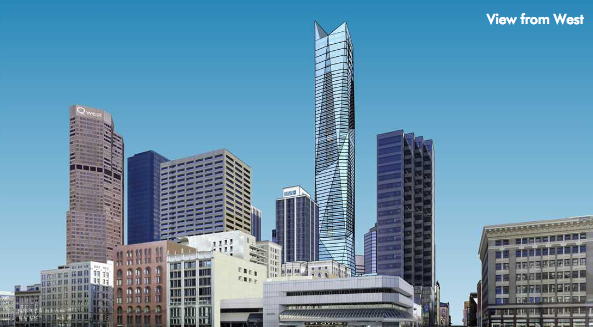Denver’s Tallest Building Doesn’t Need to Be Saddled With 10 Stories of Parking in Perpetuity

Denver is buzzing about “Six Fifty 17,” a proposed 81-story tower at 17th and California downtown. Local news coverage has ooh’d and ahh’d at the building’s looks — it would easily claim the title of Denver’s tallest building — but the renderings don’t show the disastrous effects the building could have at street level.
If built, the skyscraper would supplant a surface parking lot in the most transit-rich area of the city… with a gargantuan parking podium. The NYC-based developer, Greenwich Realty Capital, plans to devote 10 full stories of the skyscraper solely to the storage of 780 motor vehicles, BusinessDen reports.
Economist Donald Shoup, the godfather of modern parking policy, famously called government-mandated parking spaces a “fertility drug” for traffic. While this garage is the developer’s prerogative, the traffic-inducing effect will still be substantial.
There are hundreds of better uses for 10 floors in the Central Business District than car storage. If it’s going to build all that parking, the least Greenwich Realty Capital can do is ensure it’s designed to be convertible to other uses in the future.
Even appealing to a developer’s profit motive, a flexible approach makes sense, according to Brent Mather, design director and principal at the Denver office of architecture and planning firm Gensler. Mather did not comment on Six Fifty 17 specifically, but his firm has experience building parking with a future.
“Our research is all suggesting that the demand for parking is going to reduce dramatically over the next 15 years,” he said. “So our premise is, why would you build a parking structure… that’s gonna be obsolete?”
Mather pointed to 84.51, a project Gensler did in Cincinnati that has what Mather calls “future flexible” parking. There are local examples too. About 30 of the Denizen’s parking spots can be converted to retail space, the Denver Post reports, and more than 700 parking stalls will be convertible at the planned World Trade Center campus.
Those developers voluntarily designed their projects that way — there’s nothing on the books that requires it. Asked what the city could do, hypothetically, to incentivize or require convertible parking around the city, Denver Community Planning and Development spokesperson Andrea Burns said change could happen through a new zoning amendment, building code amendment, or area-specific design guidelines. “Each would take a different path but each would and should involve community and industry voices at the table,” she said. Voters could also pass a measure not unlike the green roofs initiative from last year.
Even if it costs a bit more to build, convertible parking is a better long-term investment. “It’s pretty simple,” Mather said. “If you can lease office space or lease apartments or build condos, they’re always gonna be worth more than parking. It just makes sense.”
Denver doesn’t need more parking and the traffic that comes with it. But if more parking garages are coming, they should be future-proofed for a world with fewer cars and less traffic.
This article was changed to correct the number of stories of parking being proposed, which is 10, not eight.


